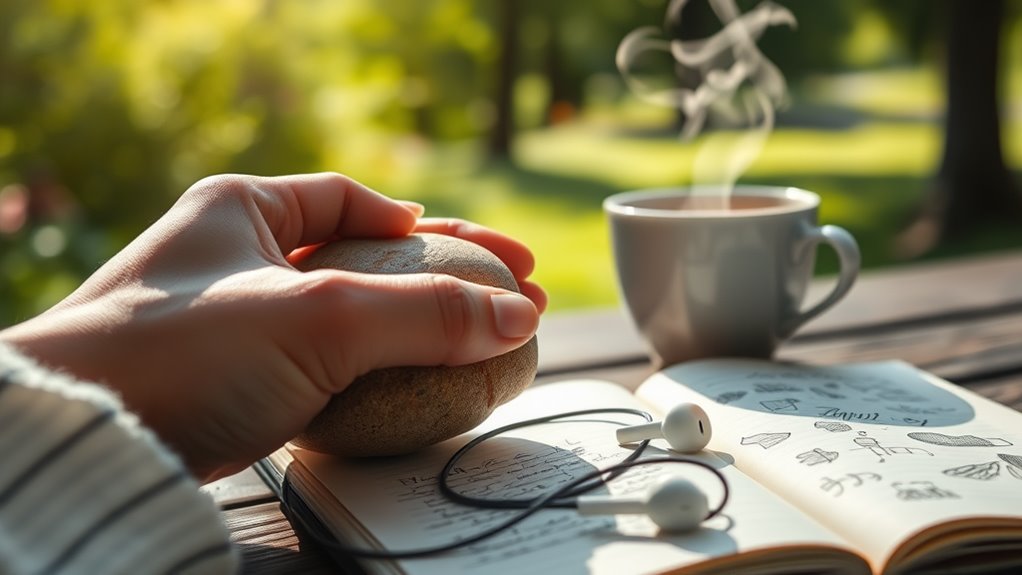The Stress Relief Tips You Wish You Knew Earlier!
Stress relief starts with knowing your stress triggers. Journaling can help you identify these patterns. Once you’ve recognized them, practice mindfulness techniques like breathing exercises or body scans to regain focus. Don’t underestimate the power of physical activity; a brisk walk or some yoga can uplift your mood. It’s essential to establish healthy boundaries, too; learn to say no to protect your time. Finally, incorporate relaxation methods, like guided imagery, into your routine. Just a few minutes can make a big difference. If you want to explore more practical strategies, there’s plenty more to uncover.
Key Takeaways
- Identify your stress triggers and document them to develop tailored coping strategies for different situations.
- Practice mindfulness techniques like breathing exercises and body scans to enhance focus and emotional regulation.
- Incorporate regular physical activity into your routine to boost mood and relieve stress naturally.
- Establish healthy boundaries by learning to say no, ensuring you protect your personal time and energy.
- Utilize relaxation methods such as guided imagery and breathing exercises to calm your mind and reduce anxiety.
Understand Your Stress Triggers
Understanding your stress triggers is essential for managing anxiety and finding relief. You mightn’t realize it, but stress awareness begins with recognizing what specifically sets off your anxiety. This process of trigger identification is vital because it allows you to address the root causes of your stress rather than simply reacting to its symptoms.
Start by keeping a journal to document situations that provoke stress. Note your feelings, thoughts, and physical sensations during these moments. Over time, patterns will emerge, helping you pinpoint specific triggers—whether they’re work-related, personal relationships, or even certain environments.
Once you identify your triggers, you can develop strategies tailored to your needs. For instance, if public speaking causes anxiety, consider practicing in smaller settings to build confidence. If deadlines stress you out, prioritize tasks and set realistic goals.
Ultimately, mastering your stress triggers empowers you to take control of your emotional landscape. By enhancing your stress awareness and understanding how your triggers operate, you can cultivate a calmer, more resilient mindset.
This proactive approach is the first step toward a more balanced and fulfilling life.
Practice Mindfulness Techniques
In moments of stress, practicing mindfulness techniques can be a transformative way to regain your focus and calm. By integrating mindfulness into your routine, you’re not just managing stress; you’re cultivating a deeper connection with yourself.
Two effective strategies are breathing exercises and meditation practices, which can ground you in the present moment.
Here are three practical mindfulness techniques you can start using today:
-
Breathing Exercises: Focus on your breath. Inhale deeply for a count of four, hold for four, then exhale slowly for another count of four. Repeat this several times to center yourself.
-
Body Scan Meditation: Lie down comfortably and mentally scan your body from head to toe. Acknowledge any tension or discomfort, then consciously release it with each exhale.
-
Mindful Observation: Choose an object in your environment and observe it closely. Notice its colors, shapes, and textures. This practice helps redirect your thoughts away from stressors.
Incorporating these mindfulness techniques into your daily life can enhance your resilience and create a more peaceful mindset.
As you master these practices, you’ll find it easier to navigate life’s challenges with grace.
Incorporate Physical Activity
Physical activity is a powerful antidote to stress, acting like a natural release valve for built-up tension. Incorporating regular exercise routines into your life can greatly enhance your mental well-being. You don’t need to set out on an intense workout regimen; even modest physical activity can make a difference.
Consider setting aside time for movement breaks throughout your day. Whether it’s a brisk walk, a short yoga session, or even stretching at your desk, these breaks can help reset your mind and body. Aim for at least 30 minutes of moderate exercise on most days—this could be as simple as dancing to your favorite music or taking the stairs instead of the elevator.
When you engage in physical activity, your body releases endorphins, the “feel-good” hormones that naturally combat stress.
Plus, achieving fitness goals, no matter how small, can boost your self-esteem and provide a sense of accomplishment.
Establish Healthy Boundaries
Finding time for physical activity is just one way to manage stress, but establishing healthy boundaries is equally important for your well-being. When you set clear limits, you create space for yourself, promoting a better work life balance.
Boundaries help you protect your time and energy, enabling you to recharge and focus on what truly matters.
To effectively establish these boundaries, consider the following:
-
Identify your limits: Know what you can handle and what feels overwhelming. This awareness allows you to communicate your needs clearly.
-
Practice assertive communication****: Don’t hesitate to express your boundaries to others. Being direct yet respectful sets a tone of mutual understanding.
-
Learn to say no: It’s okay to decline requests that infringe on your personal time. Remember, saying no can be a powerful act of self-care.
Utilize Relaxation Methods
Many people overlook the power of relaxation methods when it comes to managing stress. It’s easy to dismiss them as mere luxuries, but incorporating techniques like breathing exercises and guided imagery can have profound effects. You don’t need to spend hours; just a few minutes a day can make a difference.
Start with breathing exercises. Find a quiet space, close your eyes, and take deep, slow breaths. Inhale through your nose, letting your abdomen expand, then exhale through your mouth. This simple technique calms your nervous system, reduces anxiety, and centers your mind.
Guided imagery is another powerful tool. Picture a serene landscape—perhaps a beach or a forest. Envision yourself there, feeling the warmth of the sun or the cool breeze. This mental escape can transport you away from stressors, allowing your mind to rejuvenate.
Mastering these relaxation methods takes practice, but the benefits are well worth the effort. By dedicating time to these techniques, you’ll create a sanctuary for your mind, making it easier to face challenges with clarity and resilience.
Frequently Asked Questions
How Can I Identify My Personal Stress Triggers Effectively?
To identify your personal stress triggers, practice stress awareness by reflecting on your emotional responses in various situations. Journaling can help you recognize patterns, enabling you to address the underlying causes more effectively.
What Are Some Quick Mindfulness Techniques for Busy Schedules?
When you’re pressed for time, try mindful breathing for a few minutes. Focus on your breath, then do a quick body scan to release tension. These techniques can ground you and enhance your focus throughout the day.
How Much Physical Activity Is Considered Effective for Stress Relief?
For effective stress relief, aim for at least 150 minutes of moderate-intensity exercise weekly. Incorporating aerobic activities, like brisk walking or cycling, enhances your mood and offers significant physical and mental benefits. You’ve got this!
What Are Examples of Healthy Boundaries to Establish?
Establishing healthy boundaries involves defining relationship boundaries and prioritizing work-life balance. Communicate your limits clearly, like setting specific work hours, and guarantee personal time is respected, fostering healthier connections and reducing stress effectively.
Can Relaxation Methods Be Used During Work Breaks?
Absolutely, you can use relaxation methods during work breaks. Try breath control to center yourself, or guided imagery to transport your mind. These techniques can rejuvenate your focus, helping you tackle tasks with renewed energy.




